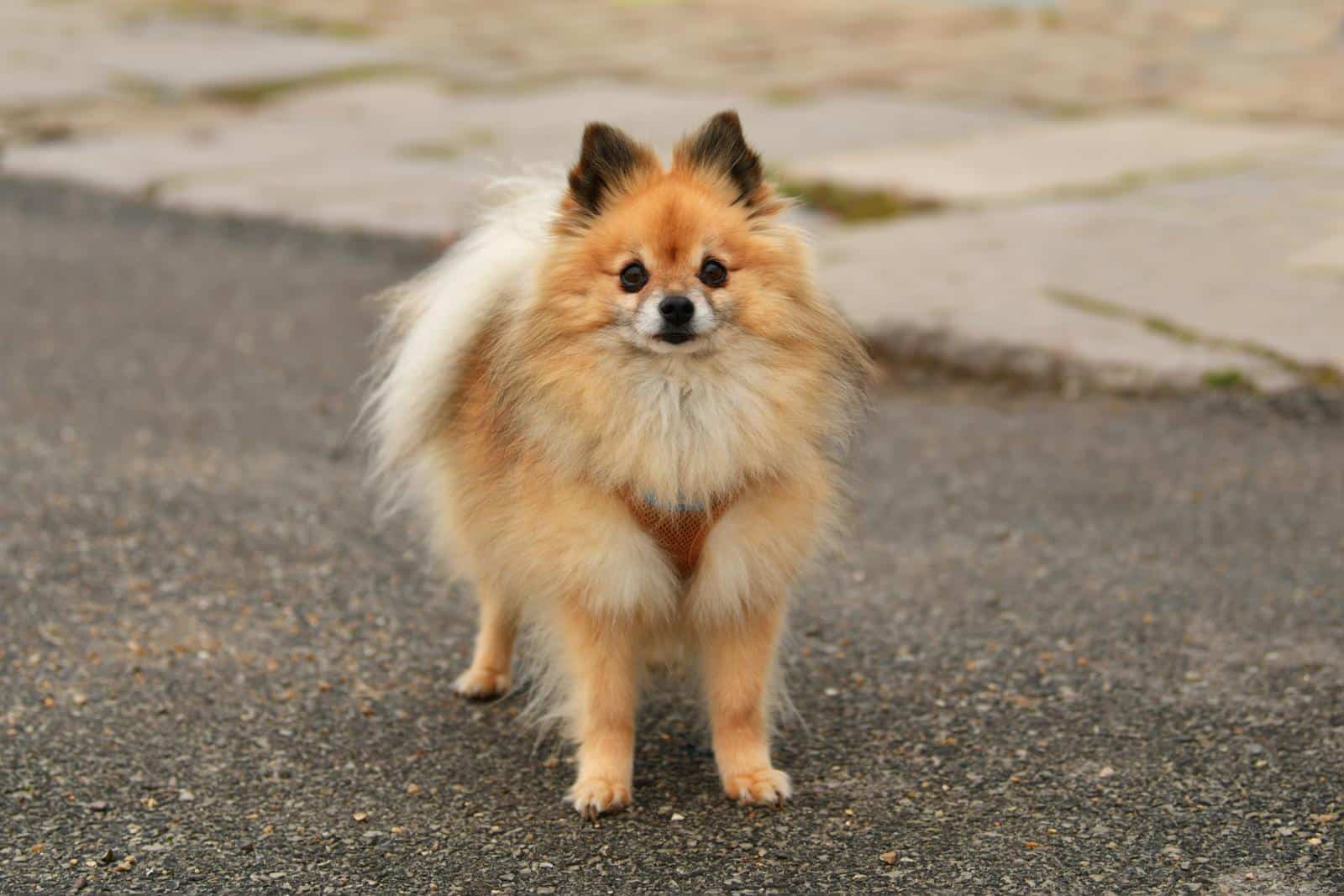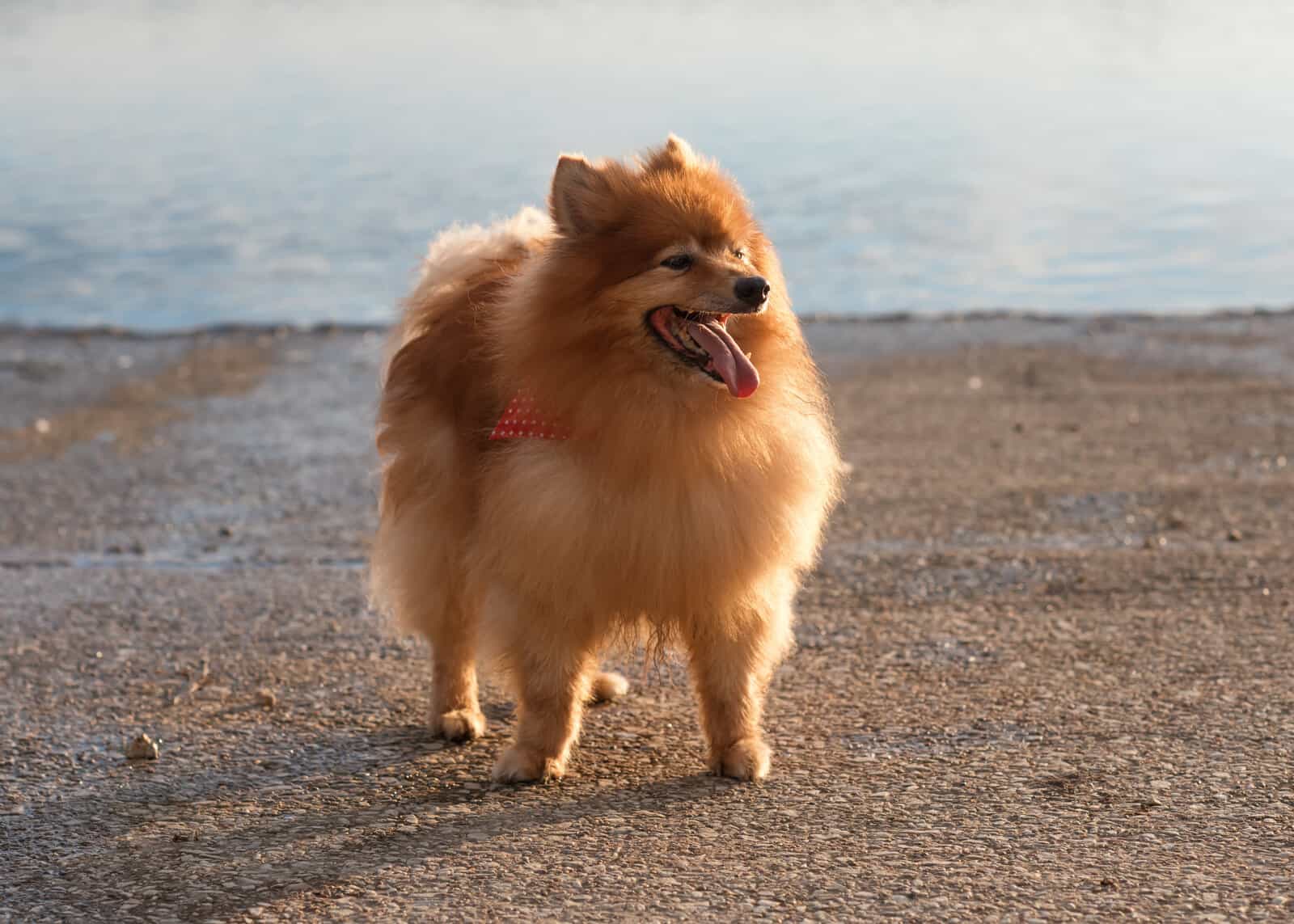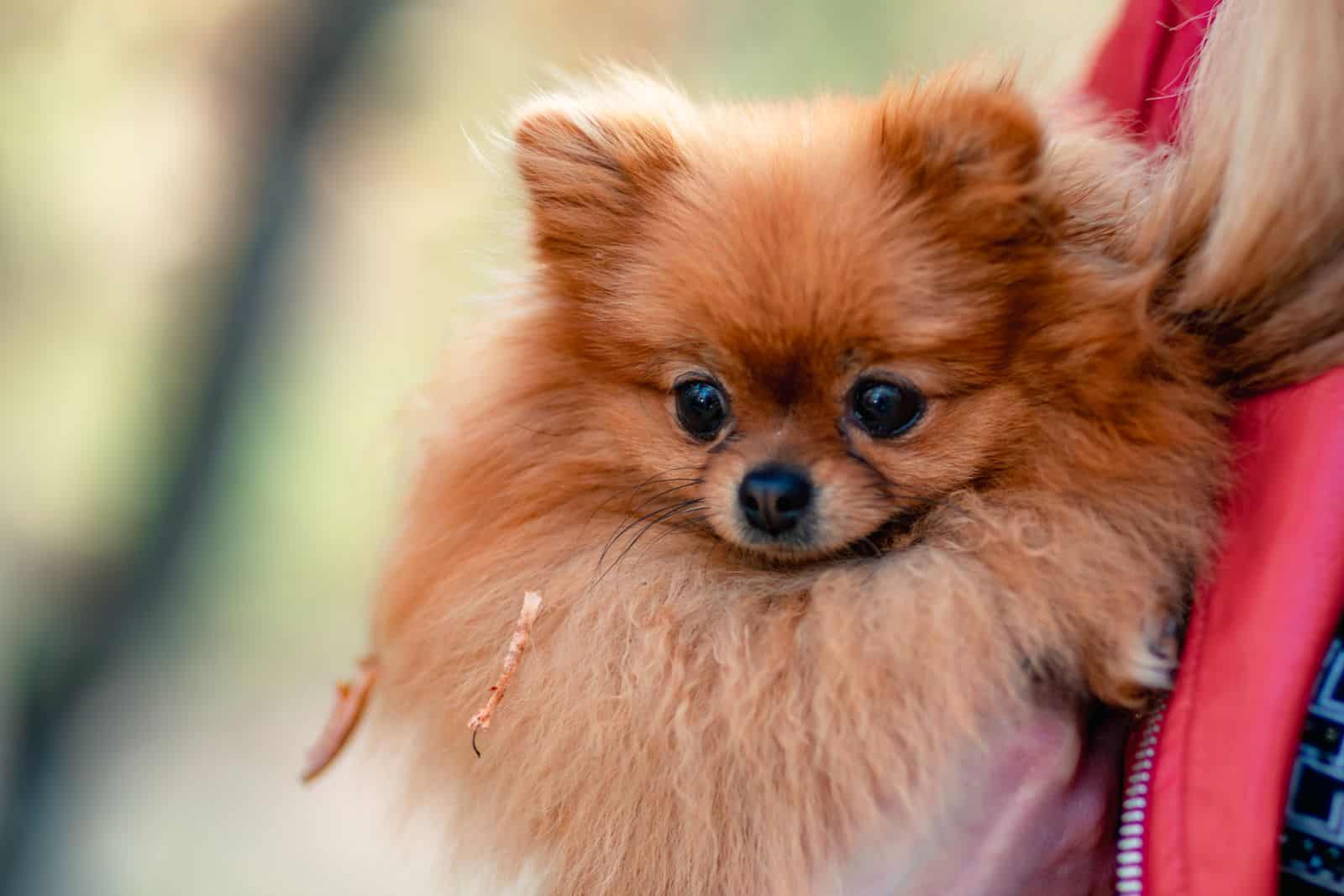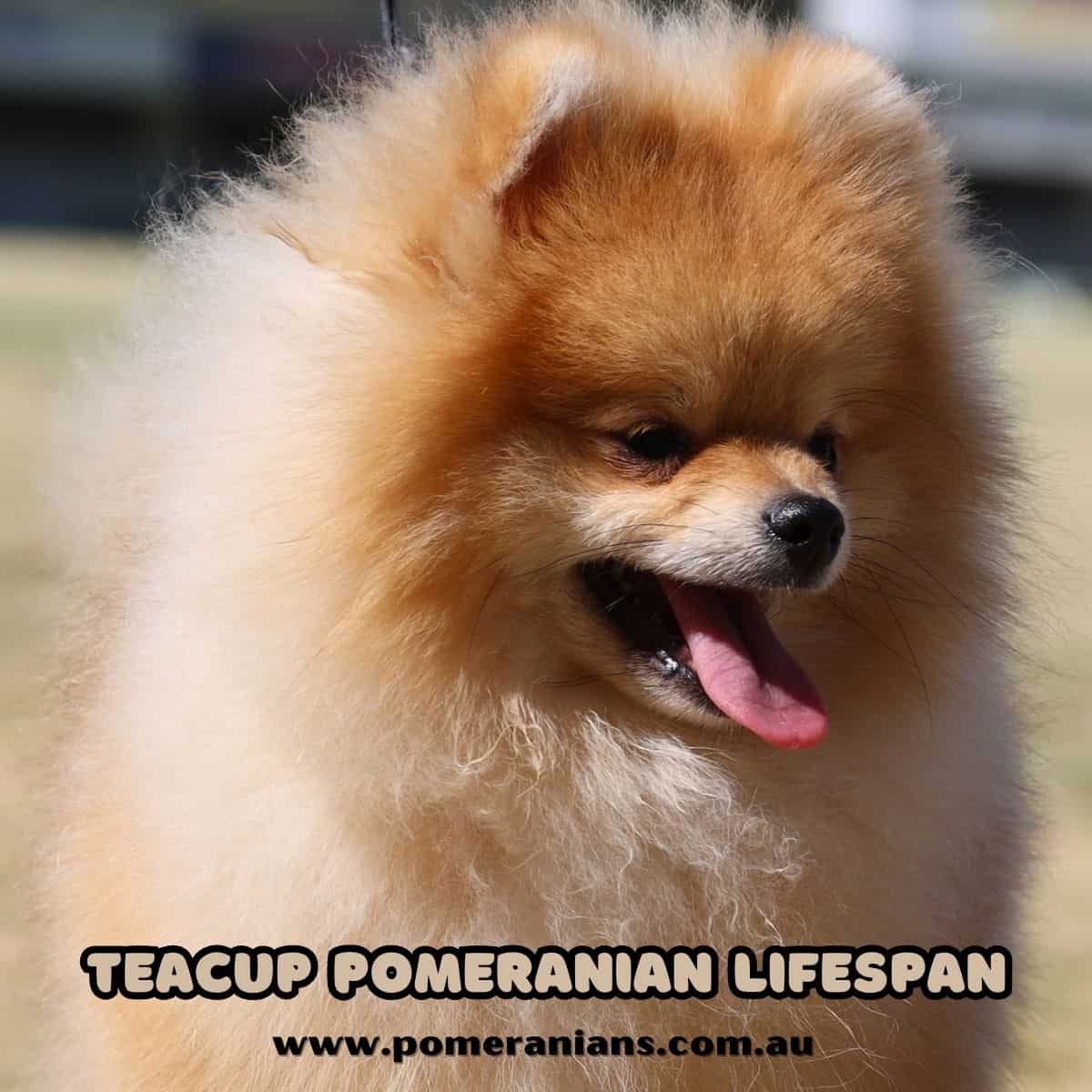Last Updated on September 1, 2023 by Denise Leo. Post first published on June 8, 2023.
Are you charmed by the pint-sized cuteness of Teacup Pomeranians? If you consider bringing one of these adorable pups into your life, you may wonder about their lifespan.
The good news is that Teacup Pomeranians live between 7 and 16 years with correct care. Genetics, health, and the care they receive affect how long your fluffy friend will be by your side.
Remember these things as you prepare to welcome a Teacup Pomeranian into your home. When I first started researching Teacup Pomeranians, I was fascinated by their small size and adorable appearance.
However, as I delved deeper into the topic, I discovered some serious concerns regarding their lifespan.
While some teacup Pomeranians live up to 12-16 years, many have a much shorter lifespan of only 3-7 years. As a pet owner, it’s essential to understand the risks and challenges of owning a teacup Pomeranian.
These dogs are often bred smaller than the standard show Pomeranian, leading to various health problems such as heart defects, respiratory issues, and dental problems. Additionally, their small size makes them more susceptible to injuries and accidents, impacting their lifespan.
Despite these concerns, many still own Teacup Pomeranians due to their adorable appearance and affectionate personalities. As with any pet, it’s essential to research and make an informed decision based on the potential risks and benefits.
Teacup Pomeranians have specific needs, and meeting those needs is essential to ensure they’re healthy and happy. By learning about their requirements and providing proper care, you can help your furry friend live a long and enjoyable life.

Frequently Asked Questions
What is the average lifespan of a Pomeranian?
The average lifespan of a Pomeranian is around 12 to 16 years. However, with proper care and attention, some Pomeranians have been known to live up to 18 years.
How Does the Lifespan of a Teacup Pomeranian Compare to a Regular Pomeranian?
Teacup Pomeranians are smaller than regular ones, so that they may have a shorter lifespan. On average, Teacup Pomeranians live for around 7 to 12 years.
What Factors Can Affect The Lifespan of a Teacup Pomeranian?
Several factors can affect the lifespan of a Teacup Pomeranian, including genetics, diet, exercise, and overall health. Proper care and attention, including regular vet check-ups, can help extend a Teacup Pomeranian’s lifespan.
Are Teacup Pomeranians Prone to any Specific Health Issues?
Teacup Pomeranians can be prone to several health issues, including dental problems, heart disease, and respiratory issues. It is essential to provide them with proper care and attention to prevent these health issues from occurring.
Are Teacup Pomeranians Healthy?
If you’re considering getting a Teacup Pomeranian, knowing these dogs may have health concerns like any other breed is essential. It’s worth noting that Teacup Pomeranians are likely to experience similar health issues to other Pomeranians.
Can Teacup Pomeranians be Easily Trained?
Teacup Pomeranians can be trained but may require more patience and consistency than regular-sized Pomeranians. Positive reinforcement training techniques can be effective in training teacup Pomeranians.
Do Teacup Poms Require Any Special Care or Attention?
Teacup Pomeranians require the same care and attention as regular-sized Pomeranians but may require more frequent meals due to their smaller size. A well-balanced diet, regular exercise, and proper grooming are essential for their health and happiness.
Teacup Pomeranian Temperament
The temperament of a Teacup Pomeranian, like any Pomeranian, can vary from dog to dog. Pomeranians are generally known for their spirited and lively personalities. They are often described as alert, intelligent, and confident little dogs.
It is crucial to note that the term “Teacup” is not recognized by official breed standards and is often used to describe tiny Pomeranians bred through selective breeding.
Various factors, including genetics, socialization, and individual personality, can still influence Teacup Pomeranians’ temperament. While some Teacup Pomeranians may exhibit the same characteristics as their larger counterparts, others may have unique traits due to their breeding history.
It’s crucial to obtain a puppy from a reputable Teacup Pomeranian breeder who prioritizes the health and well-being of their dogs. Unscrupulous Teacup Pomeranian breeders who prioritize extreme size over the dog’s health may inadvertently produce Pomeranians with temperament or health issues. It’s always recommended to do thorough research and seek out a responsible breeder who prioritizes the overall welfare of the breed.
Pomeranians, in general, are known to be lively, alert, and intelligent dogs. It’s essential to prioritize responsible breeding practices and ensure the health and well-being of any Pomeranian, regardless of size or label.

Teacup Pomeranian Lifespan
Overview
As a proud owner of a Teacup Pomeranian, I can attest that these little dogs are adorable and make great companions. However, one thing that every Teacup Pomeranian owner should be aware of is their lifespan. On average, a Teacup Pomeranian can live anywhere from 12 to 16 years, with many living several years beyond this number.
Factors That Affect Lifespan
After doing some research and consulting with my veterinarian, I have identified three main factors that can have a significant impact on the life expectancy of Teacup Pomeranians: genetics, health, and environment. Several factors can affect the lifespan of a Teacup Pomeranian, including their weight, health, and the amount of care and attention they receive.
- Teacup Pomeranians are a small breed, weighing in at just 3-7 pounds, which means they are prone to health problems such as tracheal collapse and dental issues.
- It is essential to provide them with regular check-ups and a healthy diet to ensure they stay healthy.
- Teacup Pomeranians also have a double coat that requires regular grooming to prevent matting and shedding. This means they need a lot of care and attention, which can affect their lifespan if they are not correctly cared for.
- They are also a very active and loyal dog breed, which means they need moderate exercise, training, and socialization to stay healthy and happy.
Genetics
Another crucial factor that can affect the lifespan of a Teacup Pomeranian is genetics. Some Teacup Pomeranians may be more prone to health problems or have a shorter lifespan due to their breeding.
Researching and finding reputable a Teacup Pomeranian breeder is essential to ensure that your Teacup Pomeranian has the best chance of a long and healthy life. Like all dog breeds, the lifespan of a Teacup Pomeranian is partly determined by genetics.
These dogs are generally healthy and can live up to 12-16 years, but some may have a shorter lifespan due to genetic factors. For instance, some Teacup Pomeranians might be bred from parents with health problems like tracheal collapse or Cushing’s disease.
Teacup Poms may have a shorter lifespan due to genetic factors. According to a study published in the Journal of Veterinary Medical Science, smaller dogs have a much longer lifespan than larger dogs.
Patellar luxation is a genetic disorder that affects the kneecap and is common in Pomeranians. The study found that the prevalence of patellar luxation in Pomeranians was 6.5%. This is an essential factor to consider when considering the genetics of teacup Pomeranians, as they are even smaller than regular Pomeranians and may be more prone to this disorder.
Another published study also found evidence of a genetic contribution to patellar luxation in Toy Poodle puppies. This suggests genetics also plays a role in this disorder’s development in Pomeranians.
In addition to patellar luxation, other genetic factors may contribute to teacup Pomeranians’ lifespan. A published study in the Journal of Small Animal Practice found that certain breeds, including Pomeranians, Dachshunds, and Miniature Schnauzers, have genes associated with lifespan extension.
Overall, genetics play a significant role in the lifespan of Teacup Pomeranians, just as they do in any dog breed. Responsible owners should be aware of the potential health issues that may arise due to genetics and take steps to ensure the health and well-being of their furry friend.

Health
The health of your Teacup Pomeranian is also a crucial factor that can affect its lifespan. Tiny dogs are prone to certain health problems like allergies, dental issues, and heart disease, which can all impact their longevity.
As a responsible owner, taking your Teacup Pomeranian for regular check-ups with the vet, keeping up with their vaccinations, and providing them with a moderate exercise routine and a healthy diet is essential. Teacup Pomeranians are prone to several health problems.
One of the most common issues is tracheal collapse, which occurs when the cartilage rings in the trachea weaken and collapse. This can lead to difficulty breathing, coughing, and even death.
It is essential to watch for signs of tracheal collapse, such as a honking cough, and take your Pomeranian to the vet immediately if you suspect this condition.
Another health issue that Pomeranians may face is allergies. They can be allergic to various things, such as food, pollen, or flea bites. Signs of allergies include scratching, licking, and chewing on their skin.
If you notice any of these symptoms, it is crucial to take your Pomeranian to the vet to determine the cause of the allergy and how to treat it.
Environment
The environment in which your Teacup Pomeranian lives also plays a role in their lifespan. These dogs are social creatures and thrive on attention and affection from their family.
A lack of socialization and attention can lead to severe anxiety and depression, which can harm their health and lifespan. Additionally, providing a safe and comfortable living environment, free from hazards and toxins, can help ensure a longer life for your Teacup Pomeranian.
The lifespan of a Teacup Pomeranian is affected by many factors, including genetics, health, and environment. As a loving owner, providing your Pomeranian with the care and attention they require to live a long and healthy life is essential.
By staying informed about the potential risks and taking preventative measures, you can ensure your Teacup Pomeranian lives a happy and fulfilling life by your side.

Easy Ways to Ensure Your Teacup Pomeranian Stays Healthy and Happy
Keeping your teacup Pomeranian healthy doesn’t have to be complicated. You can do some simple things as a dog owner to promote their well-being. From regular exercise to a nutritious diet, just a few tiny changes can make a big difference in your pup’s overall health:
- Ensuring a healthy diet is crucial for their well-being. Opt for high-quality dog food that is specially formulated for their breed.
- Regular exercise is also crucial for your Pomeranian’s health. Even though they are tiny dogs, they still need daily exercise to keep their muscles and joints healthy. Take your teacup dog for a short walk or play fetch in the backyard to keep them active.
- Another preventive measure is to keep up with their grooming. Teacup Pomeranians have a thick coat that requires regular brushing to prevent matting and skin issues. Additionally, routine dental care can prevent tooth decay and gum disease.
Being aware of common health issues and taking preventive measures can help ensure your teacup Pomeranian lives long and healthy.
Environment
In this section, I will discuss the three aspects of the environment that affect a teacup Pomeranian’s health: diet, exercise, and grooming requirements.
Diet
As a teacup Pomeranian owner, I know how important it is to provide my furry friend with a healthy and balanced diet. A proper diet ensures a long and healthy life for your teacup Pomeranian.
Teacup Pomeranians have a 12-16 years lifespan, and proper nutrition can significantly affect their longevity.
Pomeranians are prone to dental problems as a breed, so choosing a diet that promotes good dental health is essential. I feed my teacup Pomeranian a well-balanced diet that includes high-quality proteins, healthy fats, and essential vitamins and minerals.
I avoid feeding my dog any table scraps or human food that could harm their health. When choosing a commercial dog food, I always look for brands that use high-quality ingredients and avoid fillers and artificial preservatives.
I also select a food appropriate for my dog’s age, size, and activity level. It’s important to note that overfeeding your teacup Pomeranian can lead to obesity, significantly impacting their health and lifespan.
I always make sure to measure my dog’s food and avoid overfeeding. In addition to a well-balanced diet, I ensure that my teacup Pomeranian has access to plenty of fresh water throughout the day.
Staying hydrated is essential for good health and can help prevent urinary tract problems in dogs. Overall, providing your teacup Pomeranian with a healthy and balanced diet is one of the best things you can do for their health and well-being. Choosing high-quality foods and avoiding overfeeding can help ensure your furry friend lives long and healthy.
Exercise
As a proud owner of a teacup Pomeranian, I know how important exercise is for their overall health and well-being. While these little pups are small, they still need regular exercise to help maintain a healthy weight, prevent health issues, and extend their lifespan.
I take my Teacup Pomeranian puppy on daily walks to burn off excess energy. As they are prone to obesity, it’s essential to monitor their food intake and exercise regularly to prevent weight gain. Regular exercise is essential for a teacup Pomeranian’s physical and mental well-being.
As a small breed, they don’t require much exercise but need daily walks and playtime to keep them active and engaged. I take my teacup Pomeranian for short walks around the neighborhood twice daily.
I also play with her indoors by throwing toys and playing hide-and-seek. It’s important to avoid overexerting them, as they can quickly become tired and overheated.
Grooming
Regular grooming is essential for the well-being of Teacup Pomeranians. Neglecting their grooming needs can harm their health and lifespan.
As a caring pet owner, it’s important to make brushing your pet’s coat a weekly, if not daily, habit. Not only does it help keep their fur clean and free of dust, dirt, and mud, but it also gets rid of pesky fleas, ticks, and burrs that may be hiding in the fur.
Plus, brushing helps distribute natural oils that benefit their coat’s health. Try using a slicker brush and aim for at least two to three weekly brushings for best results. Your furry pal will thank you for the extra love and attention!

Are Teacup Pomeranians Healthy?
As with all dog breeds, Pomeranians are susceptible to various health issues that owners should be aware of. Pomeranians may experience various health issues that owners should be aware of.
Some common ones to watch out for in Pomeranians:
- Luxating patella, or a dislocated kneecap, may be a hereditary condition.
- Collapsing trachea can occur as a congenital disability or result from an accident, and it’s important to avoid using collars on Pomeranians due to their already-fragile trachea.
- Allergic reactions to food are also common among Pomeranians.
- They are also prone to skin problems such as alopecia or black skin disease.
- Cushing’s Disease.
- Hypothyroidism.
- Pomeranian Reverse Sneezing.
- May suffer from heart defects from birth.
- Dental issues.
Final Thoughts on Teacup Pomeranian Puppies
If you’re a proud Teacup Pomeranian owner, you’ll probably know they’re trendy and adorable. Remember their life expectancy, around 12 to 16 years, to ensure your furry friend has a healthy and joyful life.
However, several factors, such as weight, health, care, and genetics, can influence this. Ensure you take excellent care of them, including giving them the appropriate care, attention, and nourishment to keep them around for as long as possible.
Copyright CaninePals.Com. All Rights Reserved.
References and Further Reading:
- Official Standard of the Pomeranian (AKC). American Kennel Club, 2011.
- Official English Kennel Club Pomeranian Breed Standard, 2017.
- Kimbering Pomeranians “1891-1991”.
- Denise Leo, The Pomeranian Handbook.
- L.Ives, Show Pomeranians.
- L.Ziegler Spirer & H.F. Spirer, This is the Pomeranian.
- FEDERATION CYNOLOGIQUE INTERNATIONALE (FCI) German Spitz, including Keeshond and Pomeranian Breed Standards. PDF file.


